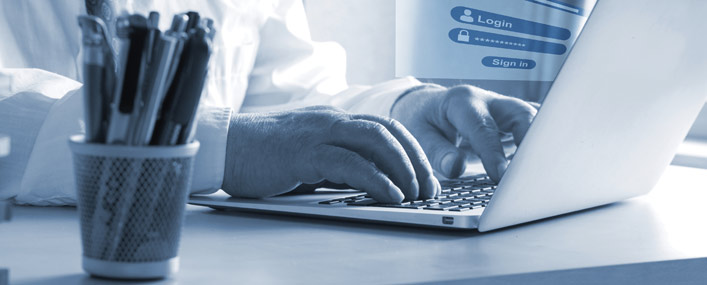
Editor’s Note: Just in time for the holidays, Kate and the Post Computers team tackle the dreaded password conundrum that comes with new tech, dispelling myths about how to handle them and offering advice for crafting and protecting these necessary tech tools.
By Kate Thresher and The Team at POST Computers
prime@pocosys.com
Passwords. Chances are, if you have a computer, you have passwords – whether you know them or not.
This time of year, new computers, phones, tablets, and other such devices are super common, and with new devices come the inevitable reentry of user account information and passwords. If you’re like me, at this point you can’t even count how many accounts you have.
Between emails, shopping, banking, services, subscriptions, apps, newsletters, blogs, work accounts, etc., the average person has A LOT of passwords to forget…err…uhh…remember.
I don’t know about you, but for me passwords have always been a pain. Not just the passwords though. Remembering which username and password combination goes to which website can be a trick and a half as well. I can’t even tell you how many times I’ve gone through the whole “I Forget My Password” rigmarole.
This month, we are diving into the topic of user accounts and passwords to dispel some misconceptions about these necessary protections.
Common password myths and misconceptions
Listed here are some of the most common myths and misconceptions people hold regarding passwords and how to best use and store them
Myth: All of my passwords have to be dramatically different.
Fact: Your passwords should be different, but for the average user they don’t need to vary dramatically. Minor changes to one tried-and-true password is more than enough. (Side note: We have a password trick that we would rather not publish to retain the security – If you would like more information, send an email to prime@pocosys.com.)
Myth: I don’t have a password for that.
Fact: Just because you don’t have to enter your password in every time, doesn’t mean you don’t have one. Some of the most common things people forget they have a password to are their email, antivirus programs on subscription, Microsoft Office downloads, and other software.
Unfortunately, due to password savers built into web browsers, a lot of people forget their passwords to everyday logins.
Another common issue wit passwords arises when someone else (grandchildren, tech companies, spouse, etc.) creates accounts for you. If someone else helped you create an account, request that they write down the login information for you to hold onto – you’re entitled to your passwords!
Myth: I should use a password program on my phone or computer to help me remember.
Fact: Password savers can be convenient, but at this time are not secure. On a weekly basis, we see reports of password saving programs that have gotten hacked into, and consumer information sold or compromised.
For your protection, we do not recommend saving passwords through a service or web browser.
Myth: Passwords should never be written down.
Fact: Though 30 sticky notes all over your desk isn’t necessarily safe and secure, if done the right way, writing down your passwords somewhere that you have full control of their whereabouts is often more secure than a password manager
Password/Account tips:
Here are some easy ways to help you create strong passwords, and keep track of them.
Tip #1: Use both upper and lowercase letters, numbers, and symbols in your passwords – and make it random. I don’t mean Mk@24#dak*! kind of random, but make it something that has little to no connection to you. Don’t use any piece of your name, your birthday or anniversary, or your child/grandchild/pet’s names. If you’re stuck, pick three random words from the last novel you read and run with it.
Tip #2: Unless you’re an elephant (because elephants never forget) or your mind is a steel trap, you’re bound to forget your passwords. Write down your usernames and passwords in a notebook and put it in a locking drawer, file cabinet, or safe. When your passwords need to be updated, update the book.
Tip #3: If you are moving, check to see if you have to change service providers – especially if your email address is ------@charter.net or --------@comcast.net or -----------@verizon.net. If you have to change your email address, chances are, you’ll have to change your login information for websites that you use your email to get into (such as Amazon, subscription services, Apple/iCloud, etc.).
This is especially important if you forget your password and use your email address to reset your password. If you can’t get into your email, your account is unrecoverable.
Tip #3.1: As a follow-up to tip #3, consider getting an email account that is not location/service dependent to use for your “account” email, such as Gmail – you know, just in case.
Tip #4: Aside from your banking passwords, your email password should be your most secure password. If someone hacks or guesses your email password, chances are they can go through the password reset process on all your other accounts. Keep your email secure by creating a very strong and very well protected password.
As we are going into the new year, if you have any computer related questions – regardless if the topic has been covered or not – please send us an email at prime@pocosys.com. I would like to do a Q&A segment but need YOUR questions!
POST Computer Systems has been serving the Western Mass. community since 1992. Started in a basement in Wilbraham, the company continues to grow year after year thanks to the strength of their service department and the continued support from the local community.
If you have any questions or concerns, or to request a future Prime article topic, please reach out to the crew at POST Computer Systems by emailing: prime@pocosys.com